
向日葵的爱https://tieba.baidu.com/home/main?un=%E5%90%91%E6%97%A5%E8%91%B5%E7%9A%84%E7%88%B1&fr=pb&ie=utf-8&id=tb.1.1cd9ae0f.nzrRWDC8MqXgN29zPMwuCA
The Economist - 民族主義走向危險的道路

CHINA / NATIONALISM
Heading down a dangerous path
By fostering an ugly nationalism, Xi Jinping is making China and the world less safe
中國/ 民族主義
走向危險的道路
通過培養醜陋的民族主義,希望正在讓中國和世界變得不那麼安全
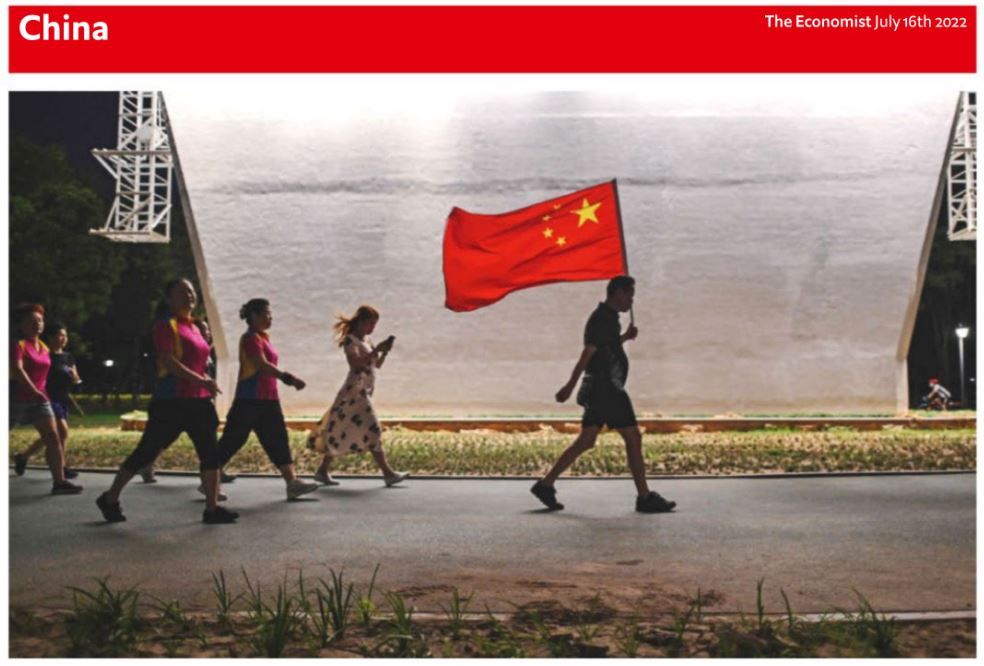
“A BE IS DEAD and that's it,” a social-media user called Zhang Beihai wrote to her 2.6m followers on Weibo, a Twitter-like platform. “He deserved to perish.” Another Weibo user went further: “His whole family deserves to die.” The assassination of Abe Shinzo, Japan's former leader, on July 8th elicited a wave of joyous reactions online in China, where he was widely reviled. “News just in,” quipped one. “US President Kennedy meets Japanese Prime Minister Abe Shinzo.”
“安倍死了,就是這樣,”一位名叫張北海的社交媒體用戶在類似推特的平台微博上給她的260萬粉絲寫信。 “他活該死。” 另一位微博用戶更進一步:“他全家活該死。” 日本前領導人安倍晉三於7 月8 日遇刺,在中國網上引起了一波熱烈的反響,他受到了廣泛的譴責。 “新聞剛剛進來,”一個人打趣道。 “美國總統肯尼迪會見日本首相安倍晉三。”
Japan is a common target of the nationalists who dominate China's digital high ground. From an early age Chinese are taught to resent the country for its invasion of China in the 1930s and 1940s, and for the atrocities it committed. Mr Abe was disliked for visiting the Yasukuni shrine in Tokyo, where war criminals are honoured, and for expressing support for Taiwan, which China regards as its territory. One commenter on Weibo said she would “applaud” if the whole of Japan were to “sink to the bottom of the sea”.
日本是主導中國數字高地的民族主義者的共同目標。中國人從小就被教導憎恨國家在1930 年代和1940 年代對中國的入侵,以及它所犯下的暴行。安倍不喜歡參拜供奉戰犯的東京靖國神社,以及表達對中國視為其領土的台灣的支持。一位微博評論說,如果整個日本“沉入海底”,她會“鼓掌”。
But Japan is only one of many targets. The nationalists scorn America, all of its friends, and Chinese people they deem to be pro-Western. Their vitriol rarely suffers the censorship to which liberal sentiment is routinely subjected. Some of China's biggest online celebrities are nationalists whose social-media accounts attract millions of followers. Mobs quickly form online, using microblogs, short videos and messaging apps to wage furious verbal campaigns against “traitors”, “spies” and “secondary devils” (Chinese who collaborate with foreign enemies).
但日本只是眾多目標之一。民族主義者蔑視美國及其所有的朋友,以及他們認為親西方的中國人。他們的尖酸刻薄很少受到自由主義情緒經常受到的審查。中國一些最大的網紅是民族主義者,他們的社交媒體賬戶吸引了數百萬粉絲。暴徒在網上迅速形成,利用微博、短視頻和消息應用程序對“叛徒”、“間諜”和“次要惡魔”(與外國敵人合作的中國人)發動激烈的口頭運動。
Fang Fang became an object of nationalist ire in 2020, when she wrote the 60th and final instalment of an internet diary about life in Wuhan in central China when the pandemic began. Her journal had described not only the hardships of the world's first city to experience a covid-19 lockdown, but also her own. For daring to criticise the government's bungled response, she was subjected to a torrent of online abuse from nationalists. “They behave like a pack of thugs,” Fang Fang fumed, “attacking anyone who fails to cooperate with them, launching wave after wave of attacks.” She compared the onslaught to Mao's Cultural Revolution of the 1960s and 1970s with its murderous Red Guard mobs. “Today I even saw news that people are preparing to send a squad to Wuhan to kill me,” she wrote in April 2020 as the furore swelled.
方方在2020 年成為民族主義憤怒的對象,當時她撰寫了關於武漢肺炎大流行開始時在中國中部武漢的生活的網絡日記的第60 期也是最後一期。她的日記不僅描述了世界上第一個經歷武漢肺炎封鎖的城市的艱辛,也描述了她自己的艱辛。由於敢於批評政府的反應遲鈍,她遭到了民族主義者的大量在線辱罵。 “他們就像一群打手,”方方怒道,“誰不配合他們,誰就攻擊誰,一波又一波的攻擊。” 她將這次襲擊比作臘肉在1960 年代和1970 年代的文化大革命及其凶殘的紅衛兵暴徒。 “今天我什至看到有人準備派小隊去武漢殺我的消息,”她在2020 年4 月的憤怒中寫道。
Such nationalism worries not only liberals such as Fang Fang, a former member of China's literary aristocracy. It has also raised anxiety in the West and among many of China's neighbours. Foreign observers see it as a reflection of the Communist Party's own mindset, and wonder whether it could portend more aggressive behaviour by China abroad.
這種民族主義不僅讓自由派人士擔心,比如曾是中國文學貴族的方方。這也引起了西方和許多中國鄰國的焦慮。外國觀察家將其視為共產黨自身心態的反映,並想知道這是否預示著中國在海外的更具侵略性的行為。
American officials avoid pointing fingers at China when talking about the growth of nationalism in authoritarian countries—but it is on their minds. In a national-security directive published in March 2021, President Joe Biden said “America's fate” was becoming increasingly linked to events abroad. “We face a world of rising nationalism, receding democracy, growing rivalry with China, Russia and other authoritarian states,” he said. His secretary of state, Antony Blinken, made a similar point two months later. “Nationalism is resurgent, repression is rising…and attacks against the rules-based order are intensifying,” he told a virtual meeting of the UN Security Council. He was clearly thinking of China.
美國官員在談論威權國家民族主義的增長時避免指責中國——但這是他們的想法。在2021 年3 月發布的國家安全指令中,總統喬·拜登表示,“美國的命運”正越來越與國外事件聯繫在一起。 “我們面臨著一個民族主義抬頭、民主衰退、與中國、俄羅斯和其他威權國家的競爭日益加劇的世界,”他說。兩個月後,他的國務卿安東尼·布林肯(Antony Blinken) 也提出了類似的觀點。 “民族主義正在死灰復燃,鎮壓正在上升……對基於規則的秩序的攻擊正在加劇,”他在聯合國安理會的一次虛擬會議上說。他顯然想到了中國。
Russia's invasion of Ukraine appeared to vindicate some of America's anxieties. Western officials now wonder whether nationalism in China—both the leadership's and that of the Chinese public—may lead it down a similar path. They worry most about the fate of democratic Taiwan. Taking control of the island has been a project of Chinese nationalism since 1949, when the Communist Party seized power on the mainland, forcing the defeated Nationalist Party, or Kuomintang (KMT), to flee to Taiwan. In 2017 China's leader, Xi Jinping, said the country's “complete reunification” was an “inevitable requirement for realising the great rejuvenation of the Chinese nation”, which he has said should be completed by mid-century. Like his predecessors, he has not ruled out using force.
俄羅斯入侵烏克蘭似乎證明了美國的一些焦慮。西方官員現在想知道中國的民族主義——無論是領導層的還是中國公眾的——是否會導致它走上類似的道路。他們最擔心民主台灣的命運。自1949 年共產黨在大陸奪取政權,迫使被擊敗的國民黨或國民黨(國民黨)逃往台灣以來,控制該島一直是中國民族主義的項目。 2017年,中國領導人希望表示,國家“完全統一”是“實現中華民族偉大復興的必然要求”,他說應該在本世紀中葉完成。和他的前輩一樣,他也不排除使用武力。
How much will nationalism shape Mr Xi's decisions about whether to attack Taiwan? Or to use military muscle against other countries with which China has territorial disputes? They are numerous. China claims the Japanese-controlled Senkaku islands (known in China as the Diaoyu) in the East China Sea. It claims parts of the South China Sea also claimed by five other countries. It disagrees with India as to where their 3,400km border lies (see map). In meetings with foreign counterparts, Chinese officials sometimes point to public sentiment on such matters as a force that they must contend with when devising policy. Are they overegging it?
民族主義會在多大程度上影響希望關於是否攻打台灣的決定?還是對其他與中國有領土爭端的國家動用武力?它們數量眾多。中國對東海日本控制的尖閣諸島(在中國稱為釣魚島)擁有主權。它聲稱南海的部分地區也被其他五個國家聲稱擁有。它與印度不同意他們3,400 公里的邊界在哪裡(見地圖)。在與外國同行的會晤中,中國官員有時會指出公眾對此類問題的看法是他們在製定政策時必須與之抗衡的一股力量。他們是不是誇大其詞了?
Sending hate across the Strait
在海峽兩岸發送仇恨
China's nationalists are certainly becoming more easily aroused and quick to demand tough action against perceived enemies, especially Taiwan's China-sceptic leadership. Following Mr Abe's death, Sima Nan, one of China's best-known nationalists, with nearly 3m followers on Weibo, mused online about whether it would be right to assassinate Taiwan's president, Tsai Ing-wen. “The peaceful liberation of Taiwan is the desire of all Chinese people,” he wrote. “If stabbing Tsai Ing-wen to death could bring about peaceful unification, wouldn't people be overjoyed?”
中國的民族主義者當然更容易被激起,並迅速要求對所謂的敵人採取強硬行動,尤其是台灣對中國持懷疑態度的領導層。安倍去世後,中國最著名的民族主義者之一司馬南在微博上擁有近300 萬粉絲,他在網上思考暗殺台灣總統蔡英文是否正確。 “台灣的和平解放是全體中國人民的願望,”他寫道。 “如果刺死蔡英文能帶來和平統一,人們豈不是大喜過望?”
Videos have circulated on Weibo in which two nationalists go further, arguing that China should seize the opportunity now, while America is distracted by Ukraine, to launch a military assault. It could finish the job in three days, says one of them, Li Yi, an academic who has 43,000 subscribers on YouTube and thousands of followers on Weibo. Mr Li gives talks in China about his belief that peaceful unification with Taiwan—still the party's official aim—is unattainable. One of his recent lectures on this theme was given at a training academy for officials run by a district-level party committee in Beijing.
微博上流傳著兩名民族主義者走得更遠的視頻,他們認為中國應該抓住機會,趁著美國被烏克蘭分心,發動軍事進攻。它可以在三天內完成這項工作,其中一位學者李毅說,他在YouTube 上有43,000 名訂閱者,在微博上有數千名粉絲。李毅在談到中國時,表示他相信與台灣和平統一——仍然是黨的官方目標——是不可能實現的。他最近的一次關於這個主題的演講是在北京一個區級黨委開辦的官員培訓學院進行的。
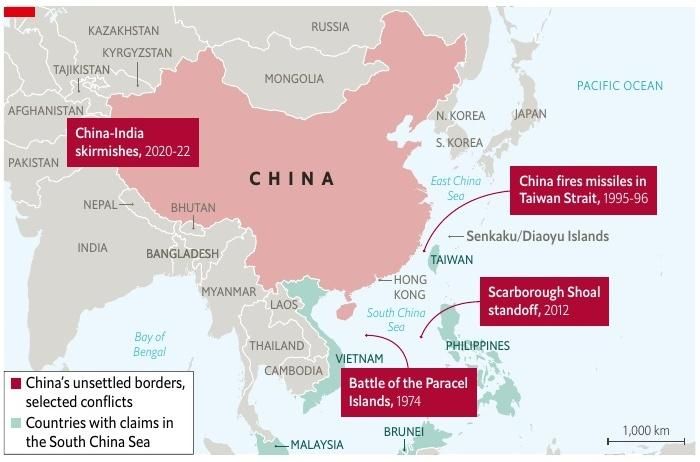
But Mr Li's opinions are controversial, even within the establishment. In 2020 Qiao Liang, a hawkish former general, published an unusual rebuke to those who have been demanding an invasion of Taiwan. No government decision, he said, is made merely on the basis of public views. “Restraining factors must first be considered.” He wrote that doing otherwise “may be patriotic in name, but harm the country in practice”. Hu Xijin, a former editor of the Global Times, a chest-thumping tabloid in Beijing, suggested in a recent vlog that public opinion would not goad China into action. “If we think that the time isn't ripe for resolving the Taiwan problem militarily,” he said, “no force can compel us to start a conflict.”
但李毅的觀點是有爭議的,即使在建制派內部也是如此。 2020年,鷹派前將軍喬亮對那些一直要求入侵台灣的人發表了不同尋常的斥責。他說,任何政府決定都不是僅僅根據公眾意見做出的。 “首先要考慮制約因素。” 他寫道,否則“可能名義上是愛國,但實際上會損害國家”。前北京小報《環球時報》的編輯胡錫進在最近的一段視頻博客中暗示,輿論不會促使中國採取行動。 “如果我們認為從軍事上解決台灣問題的時機還不成熟,”他說,“沒有任何力量可以迫使我們開始衝突。”
China's popular nationalism has partly been shaped by the party itself. After it crushed the Tiananmen Square protests of 1989 it ramped up the teaching of “patriotism”, which, officials insist, involves loving the party as well as the country. Since then, schools have been required to stress the humiliation China suffered at the hands of foreigners before the party seized power, going back to the opium wars launched by Britain in the 19th century. The aim is to inculcate a sense of victimhood, and gratitude to the party for making China strong again. It has helped the party's case that the country has enjoyed rapid economic growth for most of the past three decades. So, too, has Mr Xi's more assertive approach to foreign policy and a strong perception among many Chinese, especially since the global financial crisis of 2007-09, that the West is in decline.
中國流行的民族主義部分是由黨本身塑造的。在鎮壓1989 年天安門廣場抗議活動後,它加大了“愛國主義”的宣傳力度,官員們堅稱,愛國主義既愛黨又愛國家。從那時起,學校就被要求強調中共奪權前中國在外國人手中遭受的屈辱,這可以追溯到19 世紀英國發動的鴉片戰爭。其目的是灌輸一種受害意識,並感謝黨讓中國再次強大。在過去30 年的大部分時間裡,該國經濟快速增長,這有助於該黨的觀點。希望對外交政策更加自信的態度也是如此,許多中國人強烈認為西方正在衰落,尤其是自2007-09 年全球金融危機以來。
For now the party still appears capable of controlling popular nationalism to suit its purposes. Before Mr Xi took over in 2012, it occasionally permitted large-scale protests against Western countries, in part to give China diplomatic advantage by showing how much Western interests in China stood to suffer. In 1999 officials bused students to Beijing's embassy district to stage demonstrations outside the American and British missions after NATO's bombing of the Chinese embassy in Serbia (China does not accept that this was an accident). In the months leading up to Mr Xi's assumption of power the party tolerated numerous anti-Japanese protests over the contested Senkakus.
就目前而言,該黨似乎仍有能力控制民眾民族主義以適應其目的。在希望 2012 年上台之前,它偶爾會允許針對西方國家的大規模抗議活動,部分是為了通過展示西方在中國的利益將遭受多大損失,從而為中國提供外交優勢。 1999 年,北約轟炸中國駐塞爾維亞大使館後,官員們用巴士將學生送到北京使館區,在美國和英國使館外舉行示威(中國不承認這是一次意外)。在希望上台前的幾個月裡,該黨容忍了無數針對有爭議的尖閣諸島的反日抗議活動。
Mob rules
暴民規則
But Mr Xi appears more nervous than his predecessors. While fostering the online variety, he has kept real-world nationalism on a much tighter rein. Mr Xi's hard line on NGOs applies almost as much to those dedicated to nationalist causes as it does to ones that champion civil rights. Nothing has been allowed in China that is comparable to Russia's thuggish nationalist youth group, Nashi (Ours), which flourished for a few years with the Kremlin's blessing. For all the death threats that fly around online, there have been no reports of anyone being killed by nationalist protesters, which suggests that officials do not want such violence. Fang Fang and Mr Xi are in their late 60s. Their worldviews may be very different, but both have memories of the Cultural Revolution, which traumatised people across the political spectrum. Mr Xi and his father were denounced by Red Guards. A half-sister of Mr Xi was “persecuted to death”, according to an official account.
但希望似乎比他的前任更緊張。在培養網絡多樣性的同時,他更嚴格地控制了現實世界的民族主義。希望對非政府組織的強硬立場幾乎同樣適用於那些致力於民族主義事業的人,也適用於那些捍衛民權的人。在中國,沒有任何東西可以與俄羅斯民族主義青年團伙“納西”(我們的)相提並論,後者在克里姆林宮的加持下蓬勃發展了幾年。對於網上流傳的所有死亡威脅,沒有任何人被民族主義抗議者殺害的報導,這表明官員們不希望出現這種暴力行為。方方和希望已經60 多歲了。他們的世界觀可能大相徑庭,但都對文化大革命有記憶,文化大革命給不同政界的人們帶來了創傷。希望和他的父親遭到過紅衛兵的譴責。據官方報導,希望的一個同父異母的妹妹被“迫害致死”。
In 2017 the party allowed a scattering of demonstrations against South Korea over the deployment of an American anti-missile system called THAAD, which China said would threaten its security. But in the decade since Mr Xi took over, there have been no big nationalist protests on the streets. More than ever, stability has been the party's watchword. In the build-up to a five-yearly party congress which is expected to take place late this year officials have become even twitchier. Recent efforts in Henan province to deter demonstrations by account-holders in failed banks have shown how nervous they are (see next story). Since Mao's day there have been no known demonstrations relating to Taiwan. That is clearly because the party does not want bellicose crowds to complicate a relationship that could embroil China in a nuclear conflict with America.
2017 年,該黨允許針對韓國部署名為“薩德”的美國反導系統進行零星示威,中國稱該系統將威脅其安全。但在希望上台後的十年裡,街頭沒有發生過大規模的民族主義抗議活動。穩定比以往任何時候都更成為該黨的口號。在預計將在今年晚些時候舉行的五年一度的黨代會上,官員們變得更加緊張。河南省最近為阻止村鎮銀行儲戶示威的努力表明了他們的緊張程度(見下一個故事)。自臘肉時代以來,沒有任何已知的與台灣有關的示威活動。這顯然是因為該黨不希望好戰的人群使可能使中國捲入與美國的核衝突的關係複雜化。
During the pandemic, however, the party has propelled popular nationalism to new heights. Its propagandists speak of “the West's chaos and China's order”—a line that at least until recently has resonated with many Chinese who appreciated the party's huge effort to keep the virus out of the country and to deploy legions of people to contain outbreaks at home. As a result of this vigilance, the death toll was kept extremely low and most Chinese were able to go about their lives much as normal.
然而,在大流行期間,該黨將民眾的民族主義推向了新的高度。它的宣傳者談到“西方的混亂和中國的秩序”——至少直到最近,許多中國人都對這一說法產生了共鳴,他們讚賞中共為將病毒拒之門外並部署大批人員控制國內疫情爆發所做的巨大努力. 由於這種警惕,死亡人數保持在極低水平,大多數中國人能夠過上正常的生活。
But recently the mood has changed. Nationalism is no longer proving such an effective social glue. The Omicron variant of the coronavirus has been much harder to curb; lockdowns have become far more frequent. Shanghai and several other big cities have suffered weeks of draconian restrictions. Many people have protested online, accusing officials in locked-down areas of failing to provide enough help with food supplies and of making it life-threateningly difficult to get treatment other than for covid. Universities have been quiet for most of the Xi era. In May, however, frustrated students on several campuses staged small demonstrations against quarantine rules. Some netizens have been daring to say that Fang Fang got it right.
但最近心情變了。民族主義不再被證明是一種有效的社會粘合劑。武漢肺炎的Omicron 變體更難控制。封鎖變得更加頻繁。上海和其他幾個大城市已經遭受了數週的嚴厲限制。許多人在網上抗議,指責封鎖地區的官員未能在食品供應方面提供足夠的幫助,並且使除了武漢肺炎以外的其他保命治療難以持續。在希望時代的大部分時間裡,大學一直很安靜。然而,在5 月,幾個校園裡沮喪的學生舉行了反對隔離規定的小型示威活動。有些網友都敢說方方做對了。
So worried have officials become that in April, during a two-month lockdown in Shanghai, Weibo censored posts containing the first line of the national anthem: “Arise, ye who refuse to be slaves.” Recently Weibo users have again been posting that line, this time with pictures of officials dispersing protesters in Henan.
官員們如此擔心,以至於4 月,在上海為期兩個月的封鎖期間,微博審查了包含國歌第一句的帖子:“起來,拒絕做奴隸的人。” 最近,微博用戶再次發布了這條線,這次是河南官員驅散抗議者的照片。
Mr Xi knows how difficult it sometimes can be to keep patriots on message. The Tiananmen Square protests of 1989 were a dramatic example. Students took to the streets chanting “patriotism is no crime.” They described their actions as a “patriotic, democratic movement”—hoping that highlighting their love of China would help to temper the party's hostility. Their tactics worked, for a while, as leaders bickered over whether or not to acknowledge the students' patriotism. During the anti-Japanese protests of 2012 some demonstrators held up portraits of Mao. They were fans of Bo Xilai, a regional leader who had been arrested after a power struggle with Mr Xi. Mr Bo had tried to build support by appealing to nostalgia for the Mao era (those parts of it that did not involve gang violence). He was sentenced to life in prison in 2013.
希望知道,有時讓愛國者傳達信息是多麼困難。 1989 年的天安門廣場抗議就是一個戲劇性的例子。學生走上街頭高呼“愛國主義不是犯罪”。他們將自己的行為描述為“愛國、民主的運動”——希望突出他們對中國的熱愛有助於緩和黨的敵意。他們的策略在一段時間內奏效了,因為領導們為是否承認學生的愛國主義而爭吵不休。在2012 年的反日抗議活動中,一些示威者高舉臘肉的畫像。他們是地區領導人薄熙來的粉絲,他在與希望的權力鬥爭後被捕。薄熙來試圖通過喚起對臘肉時代的懷念(其中不涉及幫派暴力的那些部分)來建立支持。 2013年,他被判處無期徒刑。
For the party, online nationalism is a useful tool for crushing dissent—liberals are quickly leapt upon by nationalist trolls. But it is a murky world with pitfalls for the party, too. The neo-Maoists have long since suppressed their ardour for Mr Bo (supporting him would be far too risky under Mr Xi). However they remain vocal online, as cheerleaders for nationalist causes but also as critics of China's social ills, such as the big gap between rich and poor, corruption and the “exploitation” of migrant workers from the countryside. In 2018 the police arrested several neo-Maoist student activists who had been campaigning for better conditions for factory workers.
對黨來說,網絡民族主義是鎮壓異議的有用工具——自由主義者很快就會被民族主義的噴子撲上去。但這是一個陰暗的世界,黨也存在陷阱。新臘肉派早就壓制了他們對薄熙來的熱情(在希望領導下支持薄熙來風險太大)。然而,他們仍然在網上發聲,作為民族主義事業的拉拉隊隊員,同時也批評中國的社會弊病,例如貧富差距、腐敗和對農民工的“剝削”。 2018 年,警方逮捕了幾名一直在為工廠工人爭取更好條件的新臘肉派學生活動人士。
Maoist to the max
毛主義到極致
The online Maoists snipe at those they regard as being on the side of the “bureaucrat capitalists” who hold sway over business and politics. One of their bêtes noires is Mr Hu, the former editor of the Global Times who, with 24.5m followers on Weibo, is probably the most famous of China's online nationalists. To the neo-Maoists, he is not nationalist enough. They have excoriated him for appealing to netizens to be on their guard when responding to Mr Abe's death. Too much cheering over it has been exploited by China's critics to “blacken” the country, he argued in his vlog.
網絡上的臘肉主義者對那些他們認為站在掌控商業和政治的“官僚資本家”一邊的人嗤之以鼻。他們最喜歡的人之一是《環球時報》前主編胡先生,他在微博上擁有2450 萬粉絲,可能是中國最著名的網絡民族主義者。對於新臘肉主義者來說,他還不夠民族主義。他們譴責他呼籲網民在回應安倍晉三的死訊時保持警惕。他在自己的視頻博客中辯稱,中國的批評者利用了太多的歡呼來“黑化”這個國家。
There is a commercial aspect to China's online nationalism that must also make it tricky to assess where the public truly stands. Online influencers, who earn money by using social media to draw attention to sponsors' products, use nationalism as clickbait. People are drawn by the conspiracy theories that influencers peddle about, say, American military involvement in creating and spreading covid (disinformation that Chinese officials have eagerly encouraged to dampen speculation in the West about whether the virus may have leaked from a lab in Wuhan). Given the heavy censorship of so many subjects online, some netizens may revel in nationalist mudslinging simply because of the freedom they are given to do so. Bashing liberals carries no risks.
中國的網絡民族主義有一個商業方面,這也使得評估公眾的真實立場變得很棘手。通過使用社交媒體吸引對贊助商產品的關注來賺錢的在線影響者將民族主義用作點擊誘餌。人們被有影響力的人兜售的陰謀論所吸引,例如,美國軍方參與製造和傳播武漢肺炎(中國官員熱切鼓勵虛假信息來抑制西方關於該病毒是否可能從武漢實驗室洩漏的猜測)。鑑於網絡上如此多的主題受到嚴格審查,一些網民可能僅僅因為他們被賦予這樣做的自由而陶醉於民族主義的混戰。抨擊自由主義者沒有風險。
But the West still worries. At the party congress later this year, Mr Xi is expected to secure a third term as the party's leader. This will be a break from what many believed had become a norm: that the general secretary would serve for a maximum of two terms. When it became clear four years ago that this was Mr Xi's plan, some members of the elite grumbled about the idea. They had hoped that the party was moving towards a system of predictable, orderly succession. Some analysts now wonder whether, to justify his continued reign, Mr Xi will play up his nationalist credentials, perhaps by suggesting that only he can secure unification with Taiwan. Western diplomats are anxiously looking out for hints of a tougher line.
但西方仍然擔心。在今年晚些時候的黨代會上,希望有望獲得第三個黨的領導人任期。這將打破許多人認為已成為常態的做法:總書記最多連任兩屆。顯然四年前這就是希望的計劃,一些精英人士對這個想法表示不滿。他們曾希望該黨正朝著可預測、有序的繼任制度邁進。一些分析人士現在想知道,為了證明他繼續統治的合理性,希望是否會誇大他的民族主義身份,或許是暗示只有他才能確保與台灣的統一。西方外交官正在焦急地尋找更強硬路線的暗示。
Despite frequent forays by Chinese military aircraft and vessels around the island, there are few signs of imminent danger. But China's nationalism has turned uglier, and the politics of succession in China has always been fraught with intra-party tension. It is not impossible that opponents of Mr Xi, or those looking ahead to the day when he eventually departs from the political scene, may adopt more strident forms of nationalism. Mr Xi has nurtured a volatile force. He may not always be so able to keep it under control.
儘管中國軍機和艦船頻繁在該島附近進行襲擊,但幾乎沒有跡象表明危險迫在眉睫。但中國的民族主義變得更加醜陋,中國的接班政治一直充滿黨內緊張局勢。希望的反對者,或那些期待他最終離開政治舞台的人,可能會採取更加尖銳的民族主義形式,這並非不可能。希望培養了一股不穩定的力量。他可能並不總是能夠控制住它。
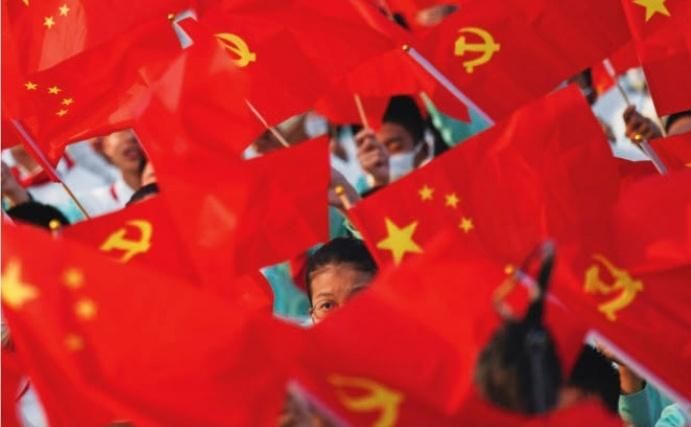
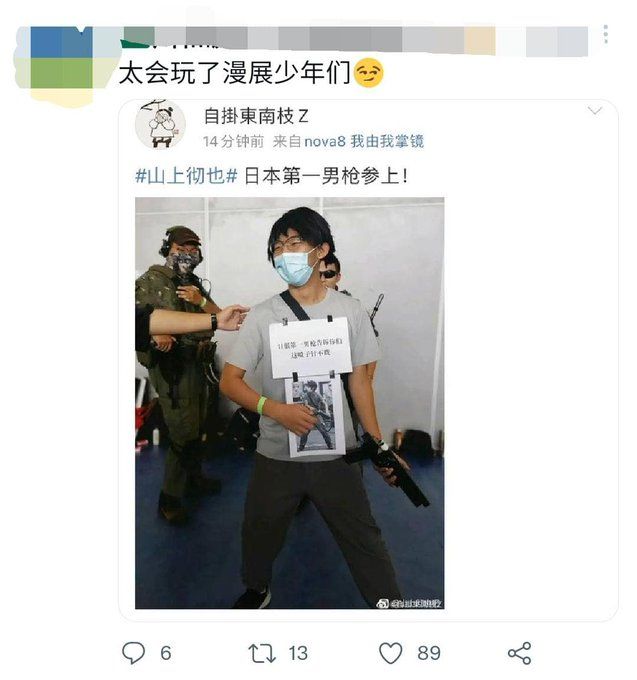
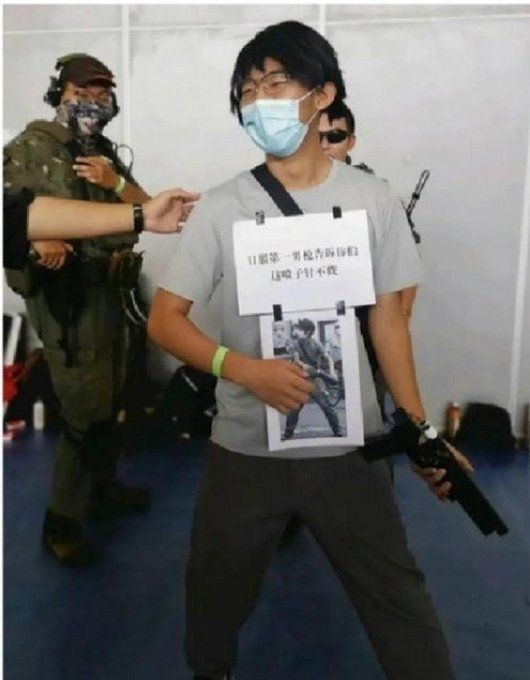
喜歡我的文章嗎?
別忘了給點支持與讚賞,讓我知道創作的路上有你陪伴。
發布評論…